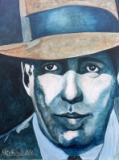The begining - The Revolutionary War
African-American history starts in the 17th century with indentured servitude in the American colonies

To the Black People who were forced to come to this land, Black Nationalism was a top priority. Self-government was what Blacks wanted more than anything else. Between 1950 and 1960, Blacks became more daring in their determination to rule themselves. For 250 years they had expressed their nationalistic desires by rebelling against whites, terrorizing whites and establishing camps that were governed by Black People.
Those espousing nationalist or separatist philosophies have envisioned nationalism in quite different ways. For some, Black Nationalism demanded a territorial base; for others, it required only separate institutions within American society. Some have perceived nationalism in strictly secular terms; others, as an extension of their religious beliefs. Black Nationalists also differ in the degree to which they identify with Africa and African culture.
The movement, which can be traced back to Marcus Garvey's Universal Negro Improvement Association of the 1920s, sought to acquire economic power and to infuse among blacks a sense of community and group feeling. Many adherents to black nationalism assumed the eventual creation of a separate black nation by African Americans. As an alternative to being assimilated by the American nation, which is predominantly white, black nationalists sought to maintain and promote their separate identity.
Black Nationalist Marcus Garvey, founder of the Universal Negro Improvement Association (UNIA), deplored black acceptance of white standards of beauty, for example, in preferring straight hair or a lighter skin color. During the 1920s he refused to place advertisements for hair straighteners or purported skin whiteners in Negro World, the UNIA newspaper. In the 1960s black nationalists embraced the political slogan Black Power, but they also proclaimed that "black is beautiful."
W. E. B. Du Bois, one of America's foremost black intellectuals and a leading figure in the founding of the National Association for the Advancement of Colored People(NAACP), had strong ties to Africa. In 1919 he organized the first Pan-African Congress. During the 1920s he traveled to Africa. Yet for most of his life, Du Bois rejected Black Nationalism. In the 1920s he opposed Marcus Garvey and the UNIA. During the 1930s, as Du Bois grew more radical, he turned to socialism and internationalism rather than to Black Nationalism. But during the harsh anticommunism of the Cold War era, Du Bois lost his faith in American society. In 1961 he abandoned the United States and settled in Ghana, where he died two years later, shortly after taking Ghanaian citizenship.
In 1966 Bobby Seale and Huey Newton founded the Black Panther Party, which advocated militant self-defense and Black Nationalism. The Black Panther Party, like SNCC Black Power advocates, embraced a Black Nationalism that was primarily secular and political. By contrast, Nation of Islam leaders Elijah Muhammad and the charismatic Malcolm X grounded their goals of racial separation in religious precepts. Black Muslims sought to establish separate economic enterprises, finding a religious justification for a racially separate business life.
In the late 1960s, at the height of the Black Power Movement, two acquaintances of Malcolm X, Gaidi Obadele and Imari Abubakari Obadele assembled a group of 500 militant black nationalists in Detroit, Michigan, to discuss the creation of a black nation within the United States. On March 31, 1968, 100 conference members signed a Declaration of Independence outlining the official doctrine of the new black nation, elected a provisional government, and named the nation the Republic of New Africa (RNA). The Republic of New Afrika took the concept of Black Nationalism to its ultimate stage when, in 1968, it declared Black People to be free and independent of the United States government.
The Republic of New Afrika declared Black People's independence because it "believes that Black People in Amerikkka make up a nation of people, a people separate and apart from the Amerikkkan people. The RNA also believes that as a nation of people, We are entitled to all of the rights of a nation, including the right to land and self-determination. The RNA further believes that all the land in Amerikkka, upon which Black People have lived for a long time, worked and made rich as slaves, and fought to survive on is land that belongs to Us as a People, and it is land We must gain control of because, as Malcolm X said, land is the basis of independence, freedom, justice and equality. We cannot talk about self-determination without discussing it within the context of land. Therefore, the RNA [identified the five states of Mississippi, Louisiana, Alabama, Georgia and South Carolina as Black People's land and] believes that gaining control of Our land is the fundamental struggle facing Black People. Without land, Black Power, rights and freedom have no substance.
According to Wilson Jeremiah Moses in his famous work Classical Black Nationalism, African nationalism as a philosophy can be examined from three different periods giving rise to various ideological perspectives for what we can today consider what African nationalism really is.
The first being pre-Classical African nationalism beginning from the time the Africans were brought ashore in the Americas to the Revolutionary period. After the Revolutionary War, a sizable number of Africans in the colonies, particularly in New England and Pennsylvania, were literate and had become disgusted with their social conditions that had spawned from Enlightenment ideas. Certain organizations as the Free African Society, African Masonic lodges and Church Institutions would serve as early foundations to developing independent and separate organizations.
By the time of Post-Reconstruction Era a new form of black nationalism was emerging among various African-American clergy circles. Separate circles had already been established and were accepted by African-Americans because of the overt oppression that had been in existence since the inception of the United States. This phenomenon led to the birth of modern African nationalism which stressed the need to separate and build separate communities that promote strong racial pride and also to collectivize resources. This ideology had become the philosophy of groups like the Moorish Science Temple and the Nation of Islam. Peaking in the Sixties African Nationalism brought on a heightened period of religious, cultural and political nationalism.
Don't miss a single page. Find everything you need on our complete sitemap directory.
Listen or read the top speeches from African Americans. Read more
Read about the great African Americans who fought in wars. Read more
African Americans invented many of the things we use today. Read more
Thin jazz, think art, think of great actors and find them here. Read more
Follow the history of Black Americans from slave ships to the presidency. Read more
Olympic winners, MVPS of every sport, and people who broke the color barrier. Read more
These men and women risked and sometimes lost their life to fight for the cause. Read more
Meet the people who worked to change the system from the inside. Read more

Visit my RedBubble page and use Michael Arnold Art to create greeting cards, T-shirts, mugs, and more.

The variety and impressive numbers of mammals, birds and marine wildlife in Alaska draw visitors from all over the world. For some travelers, Alaska is wilderness, at least compared to what they may know from back home. The pristine wilderness of Alaska is, perhaps, the last vestige of thriving populations of North American wildlife. Where else can you see polar bears, bald eagles, blue and humpbacked whales, gray wolves, grizzly bears, orcas, lynx, moose, and hundreds of other rare and endangered species in their original and undisturbed natural habitats?

Enjoy our website filled with original signed acrylic paintings by award winning Artist Michael Arnold. Located in Citrus County Florida, Michael Arnold is a the editor at the Citrus County Chronicle. When he's not busy being an editor, he is an avid artist who enjoys painting in a variety of styles. We hope you take the time to click on each image to see a larger view and to learn what the artist, Michael Arnold has to say about his paintings.

As dog owners and people who care deeply for animals and wildlife, we wanted our Dog Encyclopedia to be a website that could empower pet owners to create the most positive, loving environment for their dogs. Dog Encyclopedia realizes that owning a dog is like adding a new member to your family.

Floridian Nature has everything your are looking for in Florida nature. The wildlife of Florida is rich and varied, yet most of us are familiar with only a dozen or so species: the "well known endangered species such as manatees and panthers; those, like raccoons and squirrels, that have adapted to urban environments; the frightening alligators and black bears; and those like the armadillo who can't seem to cross the road. Yet they are just a few of the many animal species found in Florida.
